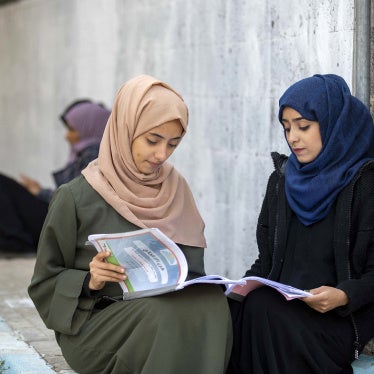During the weeks of protests that led to Egyptian President Hosni Mubarak's downfall, you saw Egyptian men and women standing together, side-by-side in the crowds.
Across the Middle East, women have taken to the streets. In Egypt and Tunisia, women carried banners and placards, demanding an end to dictatorships. In photographs of protests in Bahrain and Yemen, you see numerous female faces in the crowds, demanding a better life. Across the region, both men and women shielded their eyes from teargas, dodged rubber bullets, and hid behind walls.
Many hope that these peaceful protest movements won't just lead to new governments, but also to a new era of more rights for women. If Egypt implements stronger policies promoting women's rights, it may have a chance to join countries such as Tunisia and Morocco that have already accomplished significant reforms.
In Egypt, the protests created an unusual atmosphere where women felt comfortable in a crowded, chaotic public place. In Tahrir Square, many women noted the lack of sexual harassment - something that can be a daily occurrence in Cairo.
This atmosphere didn't last. Immediately after Mubarak resigned, people who hadn't participated in the protests over the previous two weeks swarmed the square and changed the mood. There were reported incidents of assault, like that endured by CBS news reporter Lara Logan.
But up until then, women felt safe in the crowds of demonstrators, and that they peacefully took part in the courageous protests that resulted in the amazing victory in their struggle for change and human rights. Young women as much as young men organized the protests and took part in them from beginning to end.
The protests created a pocket of goodwill, and Egyptian women's rights activists hope to seize it. They want to ensure that women participate in all parts of the government transition, and are equal partners with men in creating the new Egypt. They hope to see greater numbers of women in government, so they can help ensure that gender equality is part of the new democratic country they want to create.
While Mubarak's government did take a few measures to lift up women, it could have done much more. In the lower house of Egypt's parliament, only 64 seats out of 518 are reserved for women. According to UN statistics, nearly a quarter of working Egyptians are women. But there are zero women on the boards of professional organizations or trade unions. Some women have been appointed judges, but they remain few and far between.
During this important transitional period, women should be able to participate in the political process at all levels with no exception. They should be able to rewrite their Constitution alongside men.
The new government should protect women by ensuring that they enjoy equal rights. In areas such as marriage and divorce, guardianship, custody, and inheritance, the need for legal equality is particularly pressing. It should adopt laws criminalizing domestic violence and sexual harassment, and see that the laws are enforced.
The elation and hope that filled Tahrir Square after Mubarak's ouster should not be forgotten. Nor should the role of women in Egypt's new government.



